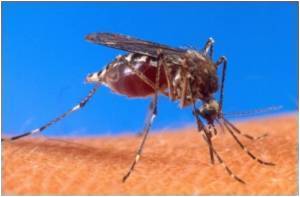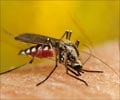Gut bacterium of an Aedes mosquito was found to reduce infection of mosquitoes by malaria parasites and dengue virus, reveal research.

George Dimopoulos and colleagues from Johns Hopkins University, USA, had previously isolated Csp_P, a member of the family of chromobacteria, from the gut of Aedes aegypti mosquitoes (which transmit dengue fever) in Panama. In the present study, they examined its actions on both mosquitoes and pathogens, and the results suggest that Csp_P might help to fight malaria and dengue fever at different levels.
The researchers added Csp_P to sugar water fed to mosquitoes and found that the bacteria were able to quickly colonize the gut of the two most important mosquito disease vectors, namely Aedes aegypti and Anopheles gambiae (the latter transmit malaria).
When the researchers tested whether Csp_P could act against the malaria or dengue pathogens directly, they found that the bacterium, likely through production of toxic metabolites, can inhibit growth of Plasmodium at various stages during the parasite's life cycle, and also abolish dengue virus infectivity. In addition, Csp_P can inhibit growth of many other bacteria.
The authors suggested that these toxic metabolites could potentially be developed into therapeutic drugs for malaria and dengue. Overall, they concluded that its broad-spectrum anti-pathogen properties together with its ability to kill mosquitoes made Csp_P a particularly interesting candidate for the development of novel control strategies for the two most important vector-borne diseases, and they therefore warrant further in-depth study.
The study is published in PLOS Pathogens.
Advertisement











